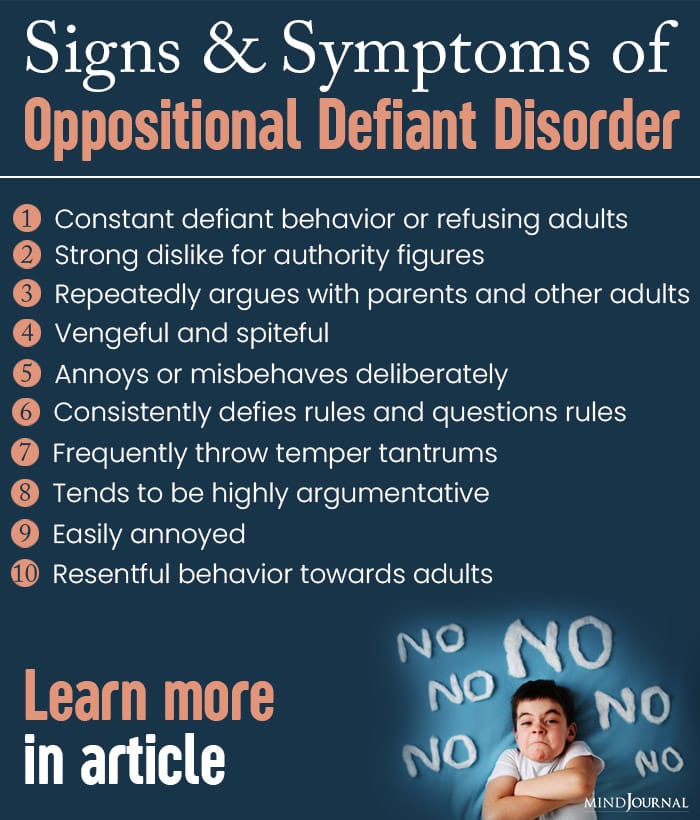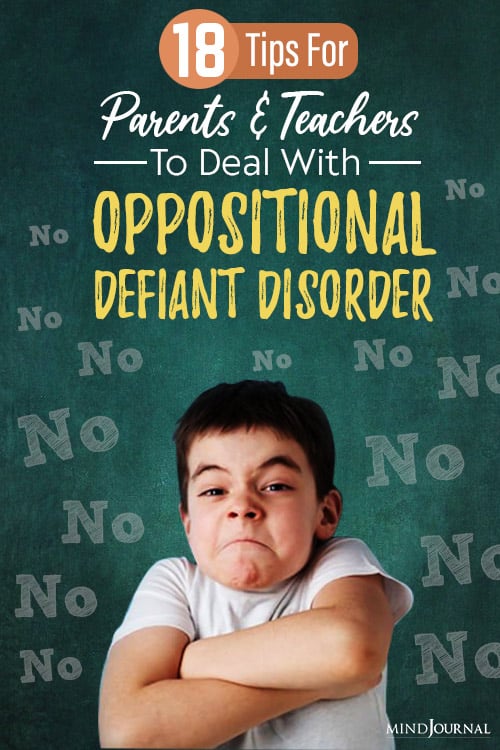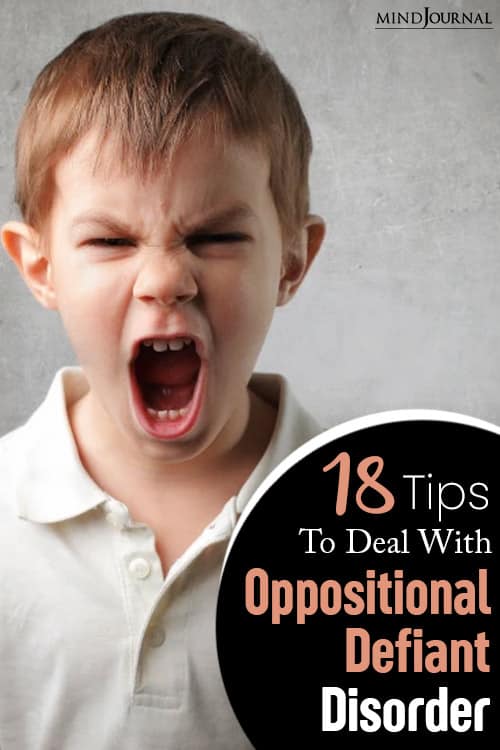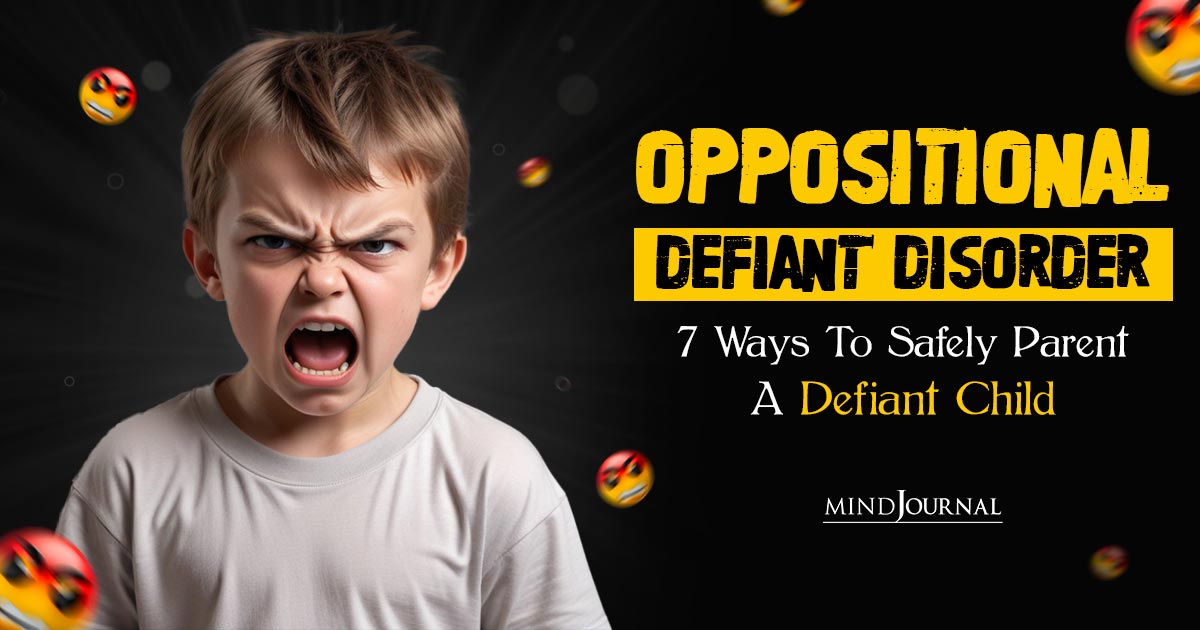Oppositional defiant disorder (ODD) is a mental condition and a behavior disorder, usually observed in children. Kids with this disorder tend to be aggressive, defiant, resistant, and stubborn towards authority figures, like parents and teachers. Let us take a closer look at ODD and how you can better deal with it.
Children And Defiance
Acting out at times is fairly common among children. They often get defiant or become stubborn when they are upset, hungry or sleepy. They can misbehave at home or even in school to disobey parents and teachers.
Such behaviors are often considered a normal stage of development during early childhood and adolescence. However, when such defiant and hostile behavior becomes common, frequent, consistent and open, then it can develop into oppositional defiant disorder (ODD).
Such behavior can not only affect the child’s healthy development, it can also affect their family, teachers, other children and authority figures. Such behavior may even hamper the child’s learning and education.

Children with oppositional defiant disorder exhibit extreme defiant behaviors that are not observed in other normal children. These behavior patterns are usually well-established, consistent, severe and long lasting.
They start showing a repeated pattern of hostility, irritability, vindictiveness, anger, antagonism and argumentativeness. As a parent, you find it increasingly difficult to manage your child or teenager.
Their behavior is not only stressful for you, but also makes you feel overwhelmed. As these children seem to be focused solely on creating chaos and disobeying others, it can often leave you feeling frustrated, exhausted, annoyed and lost.
Related: 9 Guiding Principles For More Positive Parenting
What Exactly Is Oppositional Defiant Disorder (ODD)?
ODD is a psychological and behavioral disorder involving irritability, angry mood, defiant, aggressive, argumentative & vindictive behavior towards authority figures.
“Oppositional defiant disorder (ODD) is a type of childhood disruptive behavior disorder that primarily involves problems with the self-control of emotions and behaviors,” explains a recent study.
It is classified as “disruptive, impulse-control, and conduct disorders” in American Psychiatric Association’s Diagnostic and Statistical Manual of Mental Disorders, 5th Edition (DSM-5).
The child’s behavior is typically targeted at caregivers, parents, relatives, teachers, coaches, peers and other individuals with authority. The disorder can not only adversely affect family interactions and relationships, but also hamper the child’s day to day activities at home, school or social settings.
However, children with ODD are not aggressive towards people in general, are not deceitful, do not harm animals or damage property.
According to a study, the lifetime prevalence of the condition is around 10.2% in adults, with women at 9.2% and men at 11.2%. Although there is no specific age of onset, most children with the disorder start to exhibit signs and symptoms of ODD between the ages of 6 & 8 years.
Research has found boys have a higher risk of developing consistent ODD symptoms than girls. However, no significant gender differences were observed by the researchers. Although the disorder has been found to “remit” with age in around half of the patients after a period of 3 years, some patients may eventually develop conduct disorder (CD), which is characterized by violent and hostile behavior.
It is also believed that the development of oppositional defiant disorder may be influenced by a number of complex factors and their interactions, such as genetic, environmental & psychosocial factors. In fact, researchers have found that estimated heritability of ODD is about 50%.
According to a 2016 study, ODD is a disruptive behavior disorder that typically lasts for around 6 months.
“Children and adolescents with ODD may have trouble controlling their temper and are often disobedient and defiant toward others,” the study adds. When left untreated, the disorder can lead to other comorbid conditions like –
- Attention-deficit/hyperactivity disorder (ADHD)
- Conduct disorder
- Learning disabilities
- Mood disorders, such as anxiety and depression
- Substance use disorders
- Social & emotional problems in adulthood
- Suicidal tendencies
The 2016 study states “Adults and adolescents with a history of ODD have a greater than 90% chance of being diagnosed with another mental illness in their lifetime.”
Early diagnosis and treatment involving behavioral therapy and medications can help a child to overcome the severe symptoms and live a healthier life.
Symptoms Of Oppositional Defiant Disorder

Research indicates that oppositional defiant disorder symptoms increase the risk of developing other severe mental illnesses and outcomes, especially in late adolescence.
Here are some of the most common symptoms of ODD that you need to watch out for in your disobedient and defiant child, adolescent, or teen:
- Constant defiant behavior or refusing adults
- Strong dislike for authority figures
- Repeatedly argues with parents and other adults
- Vengeful and spiteful
- Annoys or misbehaves deliberately
- Consistently defies rules and requests from adults or questions rules
- Frequently throw temper tantrums
- Tends to be highly argumentative
- Excessive anger and become annoyed easily
- Resentful and vindictive behavior towards adults
- Shifts blame on others for their own mistakes
- Irritable and easily annoyed by adults or authority figures
- Rebellious behavior
- Tends to be very rude or mean and has a bad or negative attitude towards others
- Highly defensive to feedback or positive criticism
- Feels misunderstood
- Repeatedly insults others using swear words or obscene language
Apart from these, a child with the oppositional defiant disorder may also be highly manipulative, feel very frustrated, and show signs of stress, anxiety, and depression.
Related: 25 Effective Parenting Rules For Mothers With Sons
Treatment Of Oppositional Defiant Disorder
If you can identify the above symptoms in your child from over a period of 6 months, then it is likely that they are suffering from ODD. Hence, it is imperative that you seek professional help and consult a child’s pediatrician, primary care doctor, child psychiatrist, or child psychologist about their disruptive behavior problems.
Early intervention is important as teens and adults with ODD can develop depression, substance abuse, and suicidality, when left untreated. Treatment typically depends on the patient’s age, the severity of symptoms, comorbidity, and health.
A doctor or therapist may recommend the following for effective treatment –
- Cognitive behavioral therapy (CBT)
- Parent management training (PMT)
- Family therapy
- Peer group therapy
- Medications
- Parent-child interaction therapy (PCIT)
- Anger management skills
- Problem-solving skills
- Impulse control skills
- Communication skills
Medications are usually not prescribed for the treatment of ODD, but certain medicines can help relieve symptoms associated with co-occurring disorders, like anxiety, depression, ADHD, etc.
Effective medical treatment along with positive parenting techniques can prove to be highly helpful in improving your child or teen’s behavior and prevent the symptoms from worsening.
How To Deal With Oppositional Defiant Disorder
Apart from seeking medical help, here are a few beneficial parenting strategies and techniques that can help you manage their symptoms and help them recover in the long run –
1. Follow the doctor’s instructions
Ensure that your child receives the right treatment, attends therapy sessions, and takes medications as prescribed so that the symptoms of ODD and comorbid conditions can be managed.
Also, make sure to keep all appointments with the licensed mental health professional to prioritize their treatment. You should actively participate in family therapy as required.
2. Be calm and composed in your reactions
Remain calm when communicating with a defiant child as kids with ODD often expect to engage their parents in heated arguments. Refrain yourself from reacting negatively and using minimal words explain what exactly you need from them as a parent or teacher.
If they continue arguing, withdraw yourself from the conversation. By engaging in the conversation longer than you should, you will transfer the control to your child.
3. Have a well-established structure
It is important that you create an organized environment at home with clear rules and priorities. Establish clear rules and boundaries that cannot be negotiated with. However, make sure that you don’t force a long list of rules that don’t make sense to your child.
The rules and boundaries should be targeted at improving your child’s behavior and not punishing them. So make sure the rules are practical and realistic. You also need to determine the consequences of not following the rules beforehand.
In case your child breaks a rule and faces the consequences, do not linger on it. Move on and help your child to move on. The objective is to help them learn, not punish them.
4. Make sure your child is properly cared for
You should also ensure that your child is well-fed and well-rested. Make sure that they strictly follow their bedtimes and get at least 7-8 hours of sleep each night, eat nutritious healthy food, don’t skip meals or waste food either.
An organized, healthy lifestyle can greatly help a kid with oppositional defiant disorder.
Related: 12 Powerful Parenting Phrases To Discipline Your Kid
5. Use positive reinforcement
Reinforcement can undoubtedly prove to be highly beneficial with the oppositional defiant disorder in children. Although both negative & positive reinforcement can help in behavior modification, positive reinforcement is more helpful.
This is why, when dealing with an ODD child, a parent must focus more on positive reinforcements than negative reinforcements. According to a 2021 study, positive reinforcement refers to encouraging or modifying someone’s behavior through rewards.
If your child enjoys certain activities or gifts, then you can use such rewards to encourage them to engage in desired behaviors. It can even motivate the child to continue the behavior.
The study adds “Positive reinforcement works exceedingly better and faster than punishment.”
6. Offer options and choices
Defiant children like to be in charge of the situation and strongly dislike authority figures. When a parent, caregiver, or teacher provides choices, they get the illusion of control which can help to improve their negative behavior and attitude.
However, make sure to offer them a limited number of options to choose from. Typically, 2 or 3 choices can help them make the best decisions and experience a significant sense of control.
7. Avoid negative reactions
Avoid strategies that use verbal abuse, criticism, or physical punishments for improving your child’s behavior. Using force to make them follow house rules or your instructions can adversely affect their mental and emotional health in adulthood.
One 2004 study states “Effective discipline does not instill shame, negative guilt, a sense of abandonment or a loss of trust. Instead, it instills a sense of greater trust between the child and the parent.”
Apart from these, here are some other parenting techniques that can help you cope with a child experiencing Oppositional Defiant Disorder.
- Stay away from power struggles
- Be consistent in your behavior, expectations and rules
- Create a safe and calm space in your home
- Make interactions positive and light-hearted
- Make your child responsible for their actions
- Take more time-outs and breaks
- Have patience and don’t rush to see improvements
- Spend quality time together
- Set up and follow a consistent routine
- Praise and appreciate positive behaviors of your child
- Use predictable and practical parenting behaviors and responses
- Model positive behavior and interactions
- Reduce situational and environmental triggers
- Learn and apply behavior modification techniques
- Build trust with the child and other family members, teachers, mentors, coaches etc
- Practice self-love and self-care
- Practice relaxation and mindfulness techniques, like deep breathing, yoga and regular exercise
- Seek support, if needed
Overcome oppositional defiant disorder

Kids with ODD usually respond well to positive parenting strategies. However, it is also important that you seek medical support and consult a healthcare professional for early treatment of ODD and other coexisting psychiatric disorders.
Related: 8 Signs of Poor Parenting That Has A Negative Impact On Kids
It should also be noted that children with severe symptoms of ODD have a higher chance of developing a more challenging behavioral condition known as conduct disorder.
Regardless, identifying the symptoms, seeking treatment and using preventive and positive parenting strategies can help reduce episodes and improve symptoms in the long run.












Leave a Reply